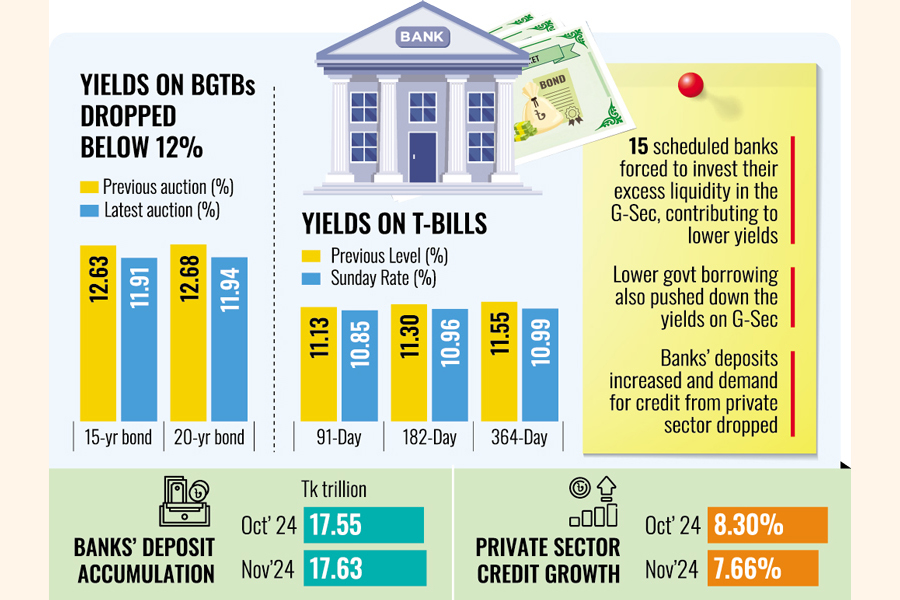Yields on T-bills, G-sec slide
Banks' deposit, lending rates likely to follow suit

Published :
Updated :

The yields on treasury bills (T-bills) dropped below 11 per cent on Sunday, showing signs of a fall in banks' deposit and lending rates in the near future, market insiders said.
The interest rates on the T-bills fell below the level after more than one year as the banks expressed willingness to invest their excess liquidity in short-term securities.
The cutoff yield, generally known as interest rate, on the 91-Day T-bills came down to 10.85 per cent on the day from 11.13 per cent of the previous level while the yield on 182-Day T-bills fell to 10.96 per cent from 11.30 per cent from earlier level.
However, the yield on 364-Day T-bills came down to 10.99 per cent on the day from 11.55 per cent earlier, according to the auction results.
The yield on 91-Day T-bills was 11 per cent on December 10, 2023. It reached a maximum of 11.75 per cent on November 24, 2024.
The falling trend in T-bill rates suggests that interest rates on both deposits and loans are likely to decrease in the near future, according to market insiders, while the yields on the government securities (G-Sec) may continue to fall in the coming months.
At least 15 scheduled banks are forced to invest their excess liquidity in the G-Sec as their deposits have increased while demand for credit particularly from the private sector has dropped, they explained.
The aggregate deposit in the country's banking system increased by 0.44 per cent to Tk 17628.56 billion in November 2024 from Tk 17552.17 billion a month before, according to the latest data of the Bangladesh Bank (BB).
On the other hand, the growth in credit flow to the private sector came down to 7.66 per cent in November 2024 on a year-on-year basis from 8.30 per cent a month ago.
Market insiders also pointed out that the central bank's selling of US dollar to commercial banks remained almost stopped, contributing to stabilising liquidity in the money market.
Talking to the FE, a senior executive of a leading private commercial bank (PCB) said most of the banks now prefer to invest their excess funds in the G-Sec because of better returns and security.
The private banker also said lower demand for credits particularly from the private sector has also pushed up investment in the risk-free government securities.
Besides, lower funding requirements of the government for the country's banking system has also pushed down the yields on G-Sec in the recent months, officials said.
A senior official familiar with the government debt-management activities said the government's credit demand has dropped mainly due to its lower expenditures.
"The interim government is likely to cut its bank-borrowing target in the near future for squeezing the overall budget deficit," the official explained.
Meanwhile, the government borrowed Tk 75 billion on the day through issuing three types of T-bills to partially meet its budget deficit.
Currently, four T-bills are transacted through auction to adjust government borrowings from the banking system. The T-bills have 14-day, 91-day, 182-day and 364-day maturity periods.
The bills are short-term investment tools issued through auction, conducted by the central bank on behalf of the government.
On the other hand, the yield on Bangladesh Government Treasury Bonds (BGTBs), particularly of 15-year and 20-year-tenure ones, earlier dropped below 12 per cent on the same ground.
The yield on 15-Year BGTBs came down to 11.91 per cent on January 28 last from the previous yield of 12.63 per cent while the yield on 20-Year BGTBs fell to 11.94 per cent from 12.68 per cent.
Furthermore, five government bonds, with tenures of two, five, 10, 15 and 20 years respectively, are traded on the market.
siddique.islam@gmail.com


 For all latest news, follow The Financial Express Google News channel.
For all latest news, follow The Financial Express Google News channel.